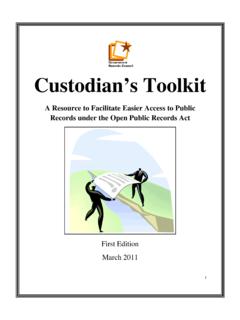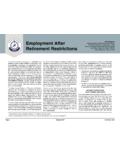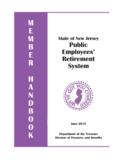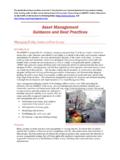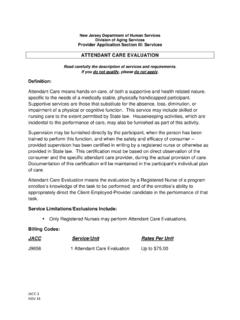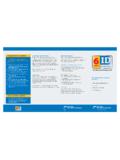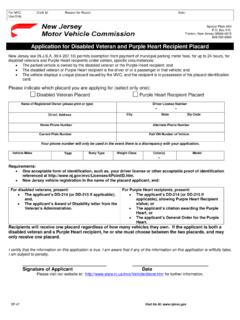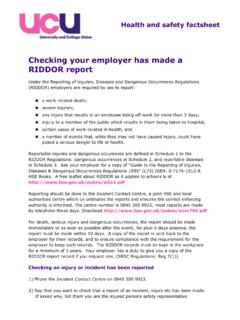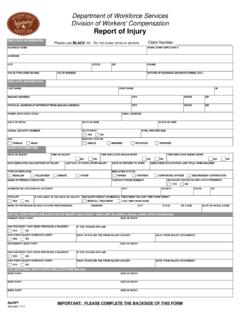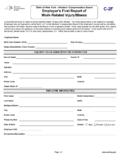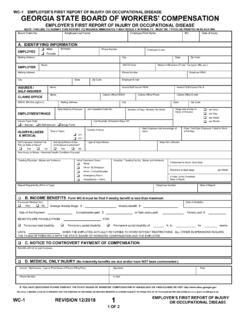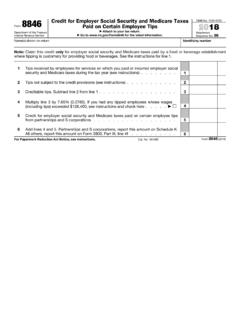Transcription of Chapter!194,!Laws!of!New!Jersey,!2009,!Relating!to ...
1 1 Wage Payment Law ( 34:11- et seq.) and Wage and Hour Law ( 34:11- 56a et seq.) Each employer must keep a record of each employee which contains the following information: 1. The name of the employee; 2. The address of the employee; 3. The birth date of the employee if the employee is under the age of 18; 4. The total hours worked by the employee each day and each workweek; 5. The earnings of each employee, including the regular hourly wage, gross to net amounts with itemized deductions, and the basis on which wages are paid; 6. Regarding each employee who receives gratuities, the total gratuities received by the employee during the payroll week; 7. Regarding each employee who receives gratuities, daily or weekly reports completed by the employee containing the following information: (a) the employee s name, (b) the employee s address, (c) the employee s social security number, (d) the name and address of the employer, (e) the calendar day or week covered by the report , and (f) the total amount of gratuities received; and 8.
2 Regarding each employee for whom the employer claims credit for food or lodging as a cash substitute for the employee who receives food or lodging supplied by the employer, information substantiating the cost of furnishing such food or lodgings, including but not limited to the nature and amount of any expenditures entering into the computation of the fair value of the food or lodging and the date required to compute the amount of the depreciated investment in any assets allocable to the furnishing of the lodgings, including the date of acquisition or construction, the original cost, the rate of depreciation and the total amount of accumulated depreciation on such assets. The employer may use any system of time keeping provided that it is a complete, true and accurate record . The employer must keep the wage and hour records described above for a period of six years.
3 The employer must keep the wage and hour records described above at the place of employment or in a central office in New Jersey. Prevailing Wage Act ( 34:11- et seq.) The Prevailing Wage Act applies to employers only under certain circumstances. Specifically, it applies only when an employer enters into a contract in excess of the prevailing wage contract threshold amount for any public work (as the term public work is defined at 34:11- ) to which any New Jersey Department of Labor and Workforce Development Chapter 194, Laws of New Jersey, 2009, Relating to employer obligation to maintain and report records Regarding Wages, Benefits, Taxes and Other Contributions and Assessments Pursuant to State Wage, Benefit and Tax Laws MW- 400 (3/18) 2 public body is a party or for public work to be done on a property or premises owned by a public body or leased or to be leased by a public body.
4 Each public works contractor must submit to the public body or lessor which contracted for the public works project a certified payroll record containing the following employee information: 1. Name; 2. Address; 3. Social security number; 4. Craft or trade; 5. Actual hourly rate of pay; 6. Actual daily, overtime and weekly hours worked in each craft or trade; 7. Gross pay; 8. Itemized deductions; 9. Net pay paid to the employee; 10. Any fringe benefits paid to approved plans, funds or programs on behalf of the employee; and 11. Fringe benefits paid in cash to the employee. Each public works contractor must, within 10 days of payment of wages, submit the certified payroll record to the public body or the lessor which contracted for the public works project. Each public works contractor which employs one or more apprentices on a public works project must maintain with its records written evidence that the apprentice or apprentices are registered in an approved apprenticeship program while performing work on the project.
5 Unemployment Compensation Law ( 43:21- 1 et seq.), Temporary Disability Benefits Law ( 43:21- 25 et seq.) and Family Leave Insurance Benefits Law, 2008, c. 17. Payroll records: Each employing unit must maintain a record for each worker engaged in employment, which record must contain the following information about the worker: 1. Full name, address and social security number; 2. Total remuneration paid in each pay period showing separately cash, including commissions and bonuses; the cash value of all compensation in any medium other than cash; gratuities received regularly in the course of employment if reported by the employee, or if not so reported, the minimum wage rate prescribed under applicable laws of this State or of the United States, or the amount of remuneration actually received by the employee, whichever is higher, and service charges collected by the employer and distributed to workers in lieu of gratuities and tips; 3.
6 An entry under the heading special payments of the amount of any special payments, such as bonuses and gifts, which have been paid during the pay period but which relate to employment in a prior period. The following shall be shown separately under this heading: cash payments, cash value of other remuneration, the nature of such payments, the period during which the services were performed for which special payments were payable; 4. The date hired, rehired and returned to work after temporary layoff; 5. The date separated from employment and the reason for separation; 6. Such information as may be necessary to determine remuneration on a calendar week basis; and 7. The number of base weeks (as the term base week is defined in 43:21- 19(t)) and wages. MW- 400 (3/18) 3 All records referred to in 1.
7 Through 7. above must be kept safe and readily accessible at the New Jersey place of business of the employing unit. All records referred to in 1. through 7. above must be retained for the current calendar year and for the four preceding calendar years. Once an employer becomes inactive, the employer must keep all records referred to in 1. through 7. above for the subsequent six quarters. Wage reporting: Each employer (other than employers of domestic service workers) must electronically file a WR- 30, Employer report of Wages Paid, with the Division of Revenue, within the Department of the Treasury, within 30 days after the end of each quarter. The WR- 30 lists the name, social security number and wages paid to each employee and the number of base weeks worked by the employee during the calendar quarter.
8 Each employer of domestic service workers (as the term domestic service worker is defined at 12:16- (b)) must file an annual, rather than quarterly, WR- 30 with the Division of Revenue, within the Department of the Treasury. Contribution reporting: Each employer (other than employers of domestic service workers) must electronically file an NJ- 927, Employer s Quarterly report , with the Division of Revenue, within the Department of the Treasury, and remit the corresponding unemployment insurance, supplemental workforce fund, workforce development partnership fund, temporary disability insurance and family leave insurance contribution payments, within 30 days after the end of each quarter. The NJ- 927 lists the total of all wages paid, the wages paid in excess of the taxable maximum, the taxable wages on which contributions are due, the number of workers employed during the pay period, the number of workers insured under a private plan for temporary disability insurance and the number of workers insured under a private plan for family leave insurance.
9 Each employer of domestic service workers (as the term domestic service worker is defined in 12:16- (c)) must file an annual, rather than quarterly, NJ- 927H, Domestic Employer s Annual report , with the Division of Revenue, within the Department of the Treasury. Temporary Disability Insurance and Family Leave Insurance information: Each employer must retain all records pertaining to any election to discontinue a private plan for temporary disability insurance and/or family leave insurance benefits and must make such records available for inspection by the Division of Temporary Disability Insurance for a one- year period from the date that the private plan is terminated. Each employer having a private plan for temporary disability insurance and/or family leave insurance must, within 10 days after the Division of Temporary Disability Insurance has mailed the employer a request for information with respect to a period of disability, furnish the Division with any information requested or known to the employer which may bear upon the eligibility of the claimant.
10 Each employer having two or more approved private plans in effect during a calendar half- year or any portion thereof must, on or before the 30th day following the close of the calendar half- year, file a report showing the amount of taxable wages paid during such calendar half- year to employees while covered under each such private plan. Each employer who provides temporary disability insurance to its employees through a self- insured private plan must, for the six- month periods ending June 30 and December 31 of each calendar year during which the self- insured private plan is in effect, file a statement with the Division of Temporary Disability Insurance, on or before the 30th day following the end of the respective six- month period showing: 1. The number of claims received during the six- month period, MW- 400 (3/18) 4 2.
